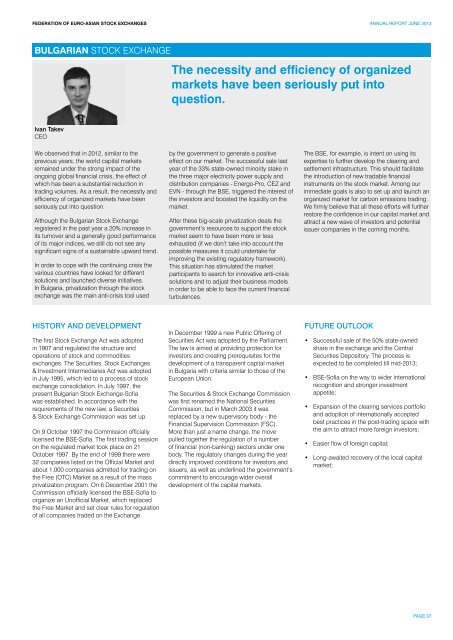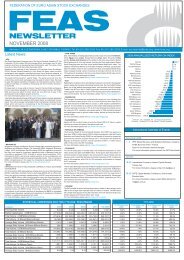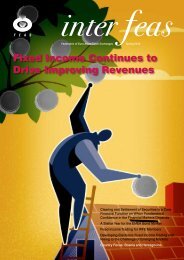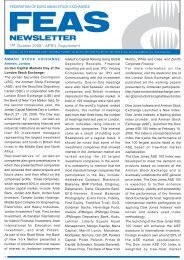JUNE 2013 - FEAS
JUNE 2013 - FEAS
JUNE 2013 - FEAS
Create successful ePaper yourself
Turn your PDF publications into a flip-book with our unique Google optimized e-Paper software.
FEDERATION OF EURO-ASIAN STOCK EXCHANGES ANNUAL REPORT <strong>JUNE</strong> <strong>2013</strong><br />
BULGARIAN STOCK EXCHANGE<br />
The necessity and efficiency of organized<br />
markets have been seriously put into<br />
question.<br />
Ivan Takev<br />
CEO<br />
We observed that in 2012, similar to the<br />
previous years, the world capital markets<br />
remained under the strong impact of the<br />
ongoing global financial crisis, the effect of<br />
which has been a substantial reduction in<br />
trading volumes. As a result, the necessity and<br />
efficiency of organized markets have been<br />
seriously put into question.<br />
Although the Bulgarian Stock Exchange<br />
registered in the past year a 20% increase in<br />
its turnover and a generally good performance<br />
of its major indices, we still do not see any<br />
significant signs of a sustainable upward trend.<br />
In order to cope with the continuing crisis the<br />
various countries have looked for different<br />
solutions and launched diverse initiatives.<br />
In Bulgaria, privatization through the stock<br />
exchange was the main anti-crisis tool used<br />
by the government to generate a positive<br />
effect on our market. The successful sale last<br />
year of the 33% state-owned minority stake in<br />
the three major electricity power supply and<br />
distribution companies - Energo-Pro, CEZ and<br />
EVN - through the BSE, triggered the interest of<br />
the investors and boosted the liquidity on the<br />
market.<br />
After these big-scale privatization deals the<br />
government’s resources to support the stock<br />
market seem to have been more or less<br />
exhausted (if we don’t take into account the<br />
possible measures it could undertake for<br />
improving the existing regulatory framework).<br />
This situation has stimulated the market<br />
participants to search for innovative anti-crisis<br />
solutions and to adjust their business models<br />
in order to be able to face the current financial<br />
turbulences.<br />
The BSE, for example, is intent on using its<br />
expertise to further develop the clearing and<br />
settlement infrastructure. This should facilitate<br />
the introduction of new tradable financial<br />
instruments on the stock market. Among our<br />
immediate goals is also to set up and launch an<br />
organized market for carbon emissions trading.<br />
We firmly believe that all these efforts will further<br />
restore the confidence in our capital market and<br />
attract a new wave of investors and potential<br />
issuer companies in the coming months.<br />
HISTORY AND DEVELOPMENT<br />
The first Stock Exchange Act was adopted<br />
in 1907 and regulated the structure and<br />
operations of stock and commodities<br />
exchanges. The Securities, Stock Exchanges<br />
& Investment Intermediaries Act was adopted<br />
in July 1995, which led to a process of stock<br />
exchange consolidation. In July 1997, the<br />
present Bulgarian Stock Exchange-Sofia<br />
was established. In accordance with the<br />
requirements of the new law, a Securities<br />
& Stock Exchange Commission was set up.<br />
On 9 October 1997 the Commission officially<br />
licensed the BSE-Sofia. The first trading session<br />
on the regulated market took place on 21<br />
October 1997. By the end of 1999 there were<br />
32 companies listed on the Official Market and<br />
about 1,000 companies admitted for trading on<br />
the Free (OTC) Market as a result of the mass<br />
privatization program. On 6 December 2001 the<br />
Commission officially licensed the BSE-Sofia to<br />
organize an Unofficial Market, which replaced<br />
the Free Market and set clear rules for regulation<br />
of all companies traded on the Exchange.<br />
In December 1999 a new Public Offering of<br />
Securities Act was adopted by the Parliament.<br />
The law is aimed at providing protection for<br />
investors and creating prerequisites for the<br />
development of a transparent capital market<br />
in Bulgaria with criteria similar to those of the<br />
European Union.<br />
The Securities & Stock Exchange Commission<br />
was first renamed the National Securities<br />
Commission, but in March 2003 it was<br />
replaced by a new supervisory body - the<br />
Financial Supervision Commission (FSC).<br />
More than just a name change, the move<br />
pulled together the regulation of a number<br />
of financial (non-banking) sectors under one<br />
body. The regulatory changes during the year<br />
directly improved conditions for investors and<br />
issuers, as well as underlined the government’s<br />
commitment to encourage wider overall<br />
development of the capital markets.<br />
FUTURE OUTLOOK<br />
• Successful sale of the 50% state-owned<br />
share in the exchange and the Central<br />
Securities Depository. The process is<br />
expected to be completed till mid-<strong>2013</strong>;<br />
• BSE-Sofia on the way to wider international<br />
recognition and stronger investment<br />
appetite;<br />
• Expansion of the clearing services portfolio<br />
and adoption of internationally accepted<br />
best practices in the post-trading space with<br />
the aim to attract more foreign investors;<br />
• Easier flow of foreign capital;<br />
• Long-awaited recovery of the local capital<br />
market;<br />
PAGE 37
















